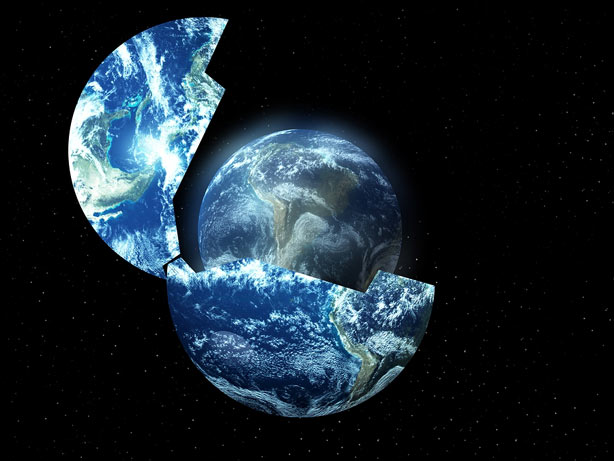
Historically speaking, this is a remarkable level of political volatility. Only three of the 10 cycles from 1960 to 1978 brought such change. It was four of 10 from 1980 to 1998.
Most Americans think the country is on the wrong track. The numbers on the right and the left who believe the system is not working for them continue to rise. Social trust, trust in government and confidence in almost every institution continue seemingly inexorable long-term declines.
Combined with rising income inequality and an era of disruptive technological advancements, this all adds up to a recipe for more tumult going forward.
Republican strategist Bruce Mehlman believes the defining clash of our time is between people who believe change is coming too slowly and those who believe change is happening too quickly.
The Too Fast coalition is full of folks who feel like strangers in their own land. People tend to blame globalization, immigration and political correctness for their problems. They turn to nativism, protectionism and isolation.
The Too Slow coalition is angry about the failure to address accelerating climate change, income inequality and mass shootings. Many in this category have lost faith in capitalism and see socialism as appealing. While the Too Fast crowd feels like the #MeToo movement has gone too far, the Too Slow proponents believe it's only scratched the surface. They see persistent civil rights failures and the enduring gender pay gap.
Both cohorts are skeptical of the establishment, elites and moderates. The Too Slow champions have come from the left, whether Bernie Sanders in the United States or Andrés Manuel Lopez Obrador in Mexico. The Too Fast champions have mostly been nationalists from the right, whether President Donald Trump or Boris Johnson in the Britain or Jair Bolsonaro in Brazil.
"Trump is a symptom, not a cause, of dissatisfaction with the way the world is," Mehlman said in an interview Sunday. "No matter whether it's Barack Obama on the left or Trump on the right, they're not bringing the change people think they want fast enough. Neither side feels like the political system, which is designed to force compromises, satisfies their base's desires for total victory."
Mehlman, a partner at one of Washington's major lobbying firms, produces quarterly reports about the political climate. In a new 35-slide PowerPoint deck, he argues that the world has become more "permissionless" because of the diminished power of traditional gatekeepers, the information technology revolution and the broad dissatisfaction with the pace of change.
"The tools of the permissionless society are the weapons of choice for both the Too Fast and the Too Slow coalitions," Mehlman said. "The permissionless world has allowed lots of new solutions that people love. Think about something like Lyft and the good side of social media. So, on one hand, permissionless paths give people a chance to solve problems that weren't being solved. At the same time, it can also reflecta world where fewer people win, where more people feel excluded and where more people become aware that they're being excluded."
Indeed, far fewer things unite Americans today than did several decades ago. Scott Clement, the director of The Washington Post's polling unit, explained in an email last night that this may both be a cause and an effect of rising partisan antipathy. There are sharper differences between parties and their voters on policy issues, which means there is greater potential for policy to swing when partisan control of government changes. This can lead to overreach as parties pass whatever policies they can while in power, after which voters punish them by swinging the next election against them.
On social trust, the General Social Survey has asked the same basic question since 1972: "Generally speaking, would you say that most people can be trusted or that you can't be too careful in dealing with people?" In the 1970s, around half of Americans said most people could not be trusted, but that's risen steadily to about two-thirds. In 1972, when Richard Nixon won his second term in a landslide, 46 percent said most people can be trusted generally. By 2016, when Trump became the first president in U.S. history to win with no prior governing or military experience, that number had tanked to 31 percent.
The pollsters who conduct the NBC-Wall Street Journal poll pose an interesting question every December: "Compared with other years, do you think that this was one of the best years for the United States, above average, about average, below average or one of the worst years?" Last month, 30 percent of Americans said 2018 was one of the best years for the country, or above average, while 45 percent said it was one of the worst years, or below average. The rest said it was average. Between 52 percent to 55 percent said it was one of the worst years in each of the past four years.
The same NBC-WSJ survey found that only 33 percent think the country is moving the right direction. Interestingly, it was 32 percent at this point in the presidencies of both Barack Obama and Bill Clinton. But only 4 percent said 2010 was one of the best years for the United States, and 21 percent thought so in 1994.
This year has already brought new demands to both accelerate and slow down change. The Democratic presidential nominating contest, which is heating up quickly, could be viewed as a contest to lead the Too Slow movement. The partial government shutdown stemmed in many ways from the frustrations of the Too Fast side about Trump's inability to follow through on a signature campaign promise.
This is a global clash. In 2019, there will be elections in countries that account for 36 percent of the planet's population, from India and the European Union to Indonesia, Nigeria, the Philippines, South Africa, Argentina, Ukraine, Canada, Afghanistan and Australia.
Sign up for the daily JWR update. It's free. Just click here.
(COMMENT, BELOW)


 Contact The Editor
Contact The Editor
 Articles By This Author
Articles By This Author